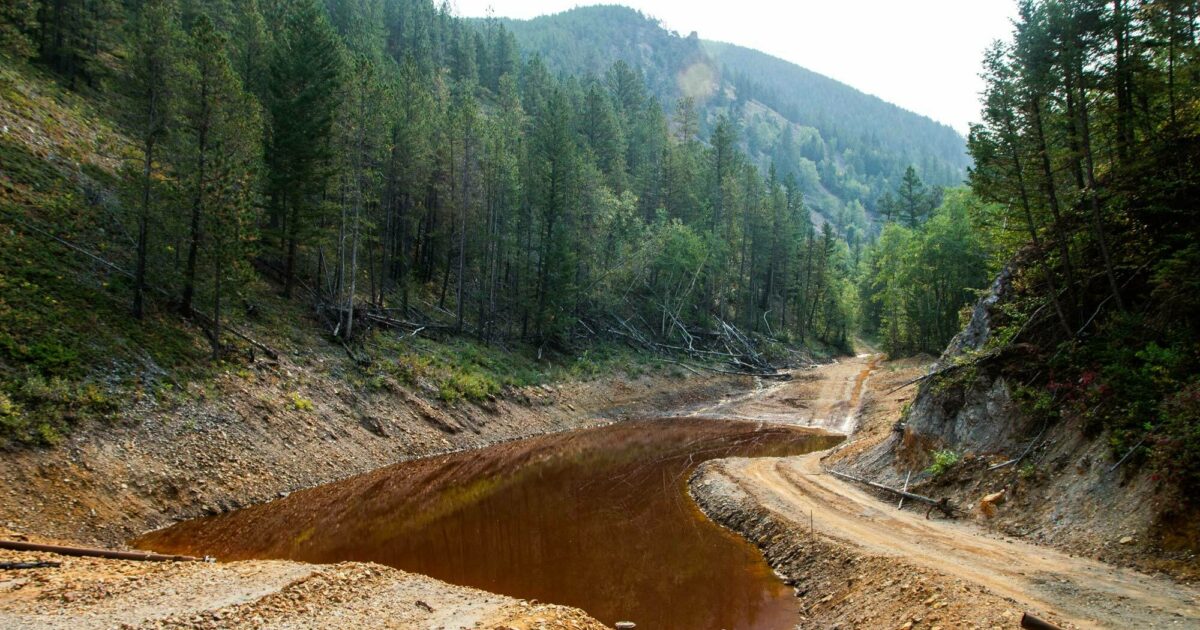Unlike coal miners, who pay the federal government between 8% and 12.5% of the gross value of what they have produced, hardrock miners have tendered no royalties on $300 billion’s worth of minerals extracted from public land over 150 years.
While the Biden administration emphasizes sustainable alternatives to mining, it has also opened the door to more extraction by invoking the Defense Production Act in response to Russia’s invasion of Ukraine. With a new mining boom looming, tribes and environmental groups are pushing alternatives, such as mineral recycling, and sounding the alarm about the patchwork of regulations that allow companies to stake claims without warning or consultation.
For years, orange-tinged streams poured off the slopes onto the tribal land below. The contamination came from a gold mine that had operated in the mountains from the 1860s until 1998. The mine used cyanide to extract the gold. The process produced tremendous amounts of toxic runoff, which included not just cyanide but acids created when the rocks were exposed to air. That all made its way into local tap water. In the late 1990s, the mine’s owners declared bankruptcy and decamped, punting cleanup costs to the American taxpayer.
Sad to see this shit is universal
Still, tribal members thought they had left behind the worst of a century and a half of damage — until October 2020. As the bans on mining on the land came up for renewal, the Trump administration’s scandal-ridden Interior Department caused a two-day delay in the bans’ publication in the Federal Register, a required step for them to remain in effect. This 48-hour gap left the federal land legally unprotected and, in those few hours, a mining company staked several claims.
Fucking looney tunes hours
But, thanks to the 48-hour gap in the mining bans, the claims on the adjacent, partially remediated federal land remain in place. Al Nash, spokesperson for the Bureau of Land Management’s Montana/Dakotas office, which facilitates publication of the bans, tells In These Times the regulation gap was unintended, caused by “some unexpected delay in completing the process to publish the public notice.” Nash did not respond to questions about the possibility of correcting the delay and revoking the claims.
Luke Ployhar, owner of the mining company — Bozeman-based Blue Arc LLC — says no backchannel communications tipped him off: He has private land in the area, had been watching the federal land for years, saw the opportunity and moved on it.
Yeah bro, just watching for that two day window for 20 years
Moreover, responsible parties — such as the former mine owner in the Little Rocky Mountains — typically declare bankruptcy instead of doing the cleanup
The House’s 2021 budget reconciliation bill imposed mining royalties and set aside $2.5 billion for cleanup, but the provisions were stripped from the Senate version by Sen. Catherine Cortez Masto (D‑Nev.), who said the use of a short-term budget process would create “uncertainty for the industry.
Good old dems
When the federal government first set aside tribal reservations, often in remote deserts and plains, they were thought of as worthless. After coveted minerals were identified in these areas, the federal government set about breaking treaties and diminishing reservations. Mines then proliferated in and around many tribal lands. Today, in the 12 western-most U.S. states, more than 600,000 Native people live within about 6 miles of hardrock mines for uranium/vanadium, gold, copper and lead, according to a 2017 study in Current Environmental Health Reports.
:deeper-sadness:
In March 2021, President Joe Biden irked Republican members of Congress when he withdrew the Trump administration’s approval of the Oak Flat mine and called for further review. To achieve permanent protection, Rep. Raúl Grijalva (D‑Ariz.) introduced the Save Oak Flat Act.
Good old dems :isaac-pog:
After Haaland was chosen to take over the Interior Department in 2020, the Bureau of Land Management “went bananas,” Holley says. “They sent letters, wanted you ‘to be a part,’ wanted you ‘to share.’ … It put fear in them because there was a Native in there.” But currently, on the ground in 2022, things are back to the old normal, he says.
:sadness:


